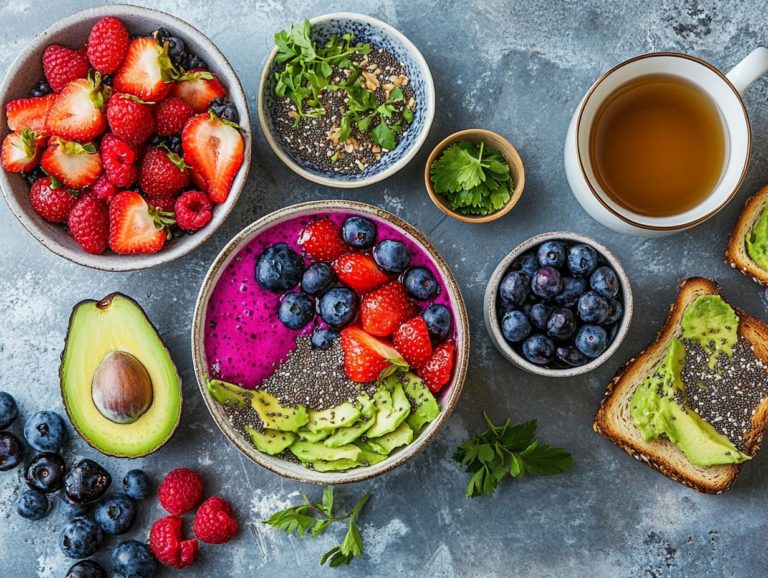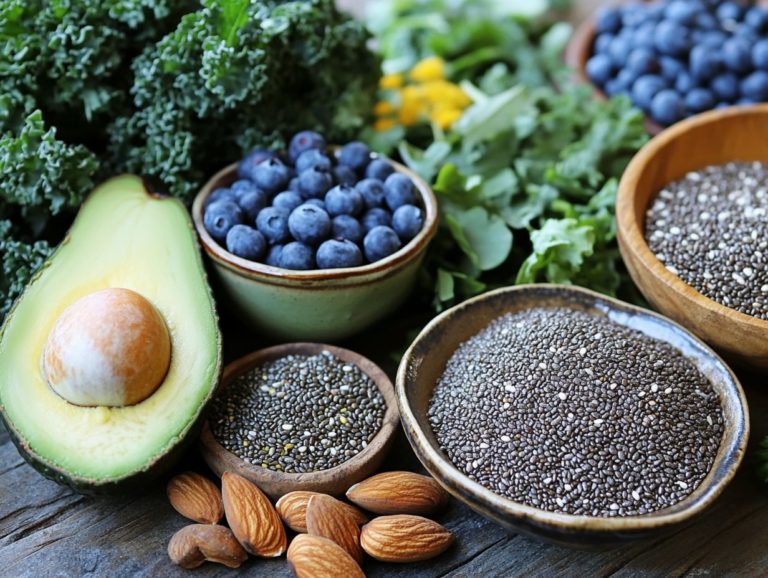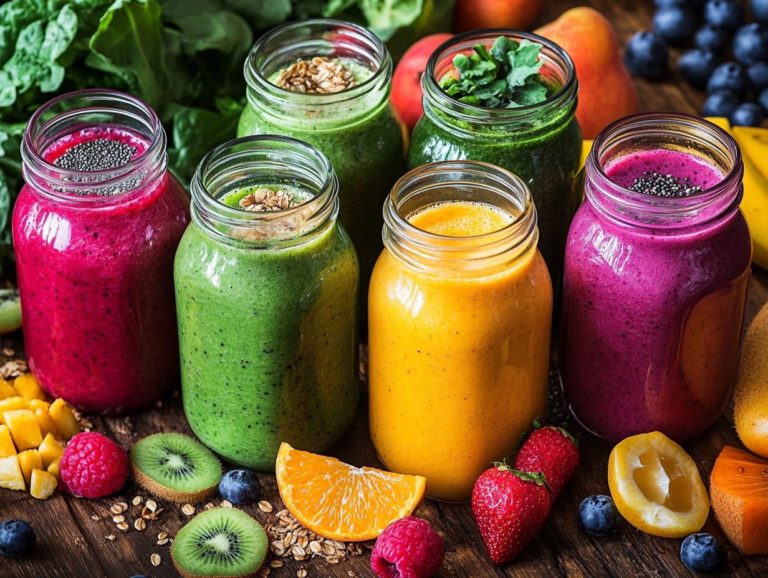Chia Seeds vs. Flaxseeds: Which is Better?
Chia seeds and flaxseeds have emerged as celebrated superfoods in recent times, but how do they truly compare? This article delves into their nutritional profiles, offering a detailed comparison of macronutrients, vitamins, and minerals.
You will uncover the distinct health benefits each seed brings to the table, from chia seeds’ role in promoting cardiovascular health to flaxseeds’ ability to help lower cholesterol. You will also discover easy ways to incorporate these nutritious seeds into your meals, complete with enticing recipes and serving suggestions.
Dive in and discover the amazing benefits of these powerful seeds!
Contents
- Key Takeaways:
- Nutritional Comparison
- Health Benefits of Chia Seeds
- Health Benefits of Flaxseeds
- Lowering Cholesterol
- Reducing Inflammation
- How to Incorporate Chia Seeds and Flaxseeds into Your Diet
- Frequently Asked Questions
- What are the amazing benefits of chia and flax seeds?
- What are the nutritional differences between chia seeds and flaxseeds?
- Which one is better for weight loss: chia seeds or flaxseeds?
- Can Chia Seeds and Flaxseeds Be Used Interchangeably in Recipes?
- Which One is Better for Heart Health: Chia Seeds or Flaxseeds?
- Are There Any Risks with Chia Seeds and Flaxseeds?
Key Takeaways:
- Both chia seeds and flaxseeds are highly nutritious and beneficial for our health, but chia seeds have a higher nutrient profile with more protein, fiber, and omega-3 fatty acids.
- Chia seeds are particularly beneficial for heart health and weight management, while flaxseeds are known for their ability to lower cholesterol and reduce inflammation in the body.
- Incorporating chia seeds and flaxseeds into your diet is easy and versatile; they can be added to smoothies, oatmeal, salads, and baked goods for a boost of nutrition and added texture.
What are Chia Seeds and Flaxseeds?
Chia seeds and flaxseeds are superfoods that you ve likely seen taking center stage in health and wellness discussions. Chia seeds come from the Salvia hispanica plant, which hails from Mexico and Guatemala. They re packed with omega-3 fatty acids, dietary fiber, and antioxidants.
Flaxseeds, with their historical roots in the Middle East, are equally impressive, boasting high levels of lignans (which are compounds that may promote heart health) and alpha-linolenic acid (a type of omega-3 fatty acid). These seeds possess remarkable nutritional profiles, making them perfect for a variety of dietary approaches, whether you re vegan or following a paleo regimen.
Chia seeds can absorb water and expand significantly, which is why they re a favorite in smoothies, puddings, and baked goods. They offer not only a delightful texture but also aid digestion. Flaxseeds typically show up ground or as oil in cereals, salads, and protein bars, allowing you to easily tap into their heart-healthy properties.
As more consumers gravitate towards plant-based options, both chia and flaxseeds have seamlessly integrated into daily meals, elevating the nutritional value and versatility of diets around the globe.
Nutritional Comparison
When you dive into the nutritional comparison of chia seeds and flaxseeds, you’ll uncover notable differences and similarities that can inform your dietary choices. Both seeds stand out as exceptional sources of dietary fiber and omega-3 fatty acids, yet their specific nutritional profiles set them apart.
Macronutrient Profile
The macronutrient profiles of chia seeds and flaxseeds highlight their potential as valuable allies in your pursuit of a balanced diet, especially if you’re aiming to boost your intake of healthy fats and dietary fiber. Chia seeds are a fantastic source of soluble fiber, while flaxseeds bring high-quality protein and omega-3 fatty acids to the table.
To put it into perspective, chia seeds pack around 34 grams of fiber per 100 grams, significantly contributing to your daily fiber requirements. This can help you feel fuller longer and support digestion. Flaxseeds aren’t far behind, offering about 27 grams of fiber per 100 grams.
Both seeds shine in the healthy fats department; chia seeds contain 31 grams of fat, primarily polyunsaturated, whereas flaxseeds deliver a robust 42 grams, loaded with omega-3s. By incorporating these nutrient-dense options into your diet, you can effectively bolster your weight management efforts and promote heart health.
Fiber plays a crucial role in managing cholesterol levels, while omega-3 fatty acids contribute to your overall cardiovascular wellness.
Vitamins and Minerals
Chia seeds and flaxseeds are not just ordinary superfoods; they are nutrient-rich foods that elevate your overall health. Each of these seeds provides a substantial dose of magnesium, calcium, and phosphorus, which are vital for maintaining robust bones and optimal cardiovascular function.
Rich in antioxidants, these seeds help fight oxidative stress in your body, potentially reducing the risk of chronic diseases. They also boast a generous amount of dietary fiber, which is essential for fostering gastrointestinal health and facilitating effective digestion.
By seamlessly incorporating chia and flaxseeds into your daily meals, you can significantly enhance nutrient absorption, ensuring your body receives adequate supplies of crucial vitamins like B vitamins and vitamin E. This thoughtful dietary approach not only bolsters your overall well-being but also aligns beautifully with your aspirations for improved nutrient intake and a healthier lifestyle.
Health Benefits of Chia Seeds
Chia seeds present an impressive array of health benefits, which is why they ve garnered such popularity among health enthusiasts and nutritionists.
Packed with omega-3 fatty acids and dietary fiber, these tiny powerhouses support cardiovascular health, aid in weight management, and promote optimal gastrointestinal function.
Their remarkable ability to absorb water also makes them an excellent ally for hydration, ensuring you stay refreshed and energized throughout your day.
Cardiovascular Health
The cardiovascular health benefits of chia seeds are largely due to their impressive levels of omega-3 fatty acids and antioxidants, which work in harmony to reduce inflammation and enhance overall heart function. By regularly incorporating chia seeds into your diet, you may find yourself lowering blood pressure and cholesterol levels, ultimately decreasing your risk of cardiovascular disease.
Scientific studies support this claim, revealing that adding these small yet mighty seeds to your meals can lead to remarkable improvements in heart health indicators. For example, participants who regularly consumed chia seeds saw significant drops in both systolic and diastolic blood pressure. Their levels of different types of cholesterol in the blood also improved, with reductions in LDL (the so-called bad cholesterol) and increases in HDL (the good kind).
Start adding chia seeds to your meals today for lasting benefits! You can sprinkle them on yogurt, blend them into smoothies, or stir them into your morning oatmeal for a delicious crunch. This versatility makes them a powerful addition to your daily meal prep.
Weight Management
Chia seeds might just transform your weight management journey! Thanks to their impressive dietary fiber content and knack for promoting feelings of fullness, they can be a game changer.
When you mix chia seeds with liquids, they expand, delivering hydration and satiety making them a stellar addition to your meals if you’re looking to keep your appetite in check. This remarkable ability not only helps you curb hunger but also supports hydration, a cornerstone for overall health and effective weight loss.
Incorporating chia seeds into smoothies, overnight oats, or even using them as a thickener in soups can effortlessly elevate your nutritional profile while keeping an eye on calorie intake. Sprinkling these tiny nutritional powerhouses on salads or yogurt adds a delightful crunch along with an extra nutrient boost.
Exploring various recipes like chia pudding or energy bites allows you to get creative with your meal prep, ensuring that adding this superfood to your diet feels enjoyable and not restrictive. With a touch of creativity, maintaining a balanced diet with chia seeds can be both satisfying and effective.
Health Benefits of Flaxseeds
Flaxseeds are celebrated for their impressive health benefits, especially when it comes to heart health and reducing inflammation. With a high concentration of lignans and alpha-linolenic acid a healthy fat found in plants they play a crucial role in lowering cholesterol levels while also providing powerful anti-inflammatory properties.
Incorporating flaxseeds into your diet is not just a smart choice; it s an essential step towards nurturing your overall well-being.
Lowering Cholesterol
The remarkable ability of flaxseed to lower cholesterol levels lies in its abundant omega-3 fatty acids and soluble fiber. These components work together in a powerful alliance to enhance heart health. By incorporating flaxseed into your diet, you can significantly reduce LDL cholesterol levels (the bad type of cholesterol), promoting overall cardiovascular function.
Recent studies reveal that regular consumption of flaxseed can lead to a notable decrease in both total and LDL cholesterol. The soluble fiber in flaxseed binds with cholesterol in your digestive system, effectively preventing it from being absorbed into your bloodstream.
Omega-3 fatty acids, celebrated for their anti-inflammatory properties, also support the health of your blood vessels. To harness these benefits, try adding ground flaxseed to your smoothies, oatmeal, or yogurt. It can also be seamlessly integrated into baked goods like muffins or pancakes, delivering both a nutritional boost and a delightful nutty flavor.
Reducing Inflammation
Flaxseed is renowned for its impressive anti-inflammatory properties, thanks to its abundant antioxidants and omega-3 fatty acids. This makes it an excellent ally for anyone dealing with chronic inflammation and its associated health concerns.
The antioxidants found in flaxseed, such as lignans and phenolic compounds, play a vital role in neutralizing free radicals in your body, helping to reduce oxidative stress. By incorporating flaxseed into your balanced diet, you can enhance your overall wellness, especially if you re looking to manage inflammatory conditions.
The presence of lignans offers cardiovascular benefits and supports hormonal balance, making flaxseed a highly versatile addition to your meals.
If you’re aiming for a holistic lifestyle, consider adding flaxseed to your smoothies, salads, or baked goods. It s a simple yet effective strategy to promote healthier living while reaping its myriad health benefits.
How to Incorporate Chia Seeds and Flaxseeds into Your Diet
Incorporating chia seeds and flaxseeds into your diet offers a delightful blend of ease and flavor, thanks to their remarkable versatility in the kitchen. Whether you’re whipping up a creamy chia pudding or drizzling flaxseed oil over your favorite dishes, you’ll discover an array of recipes and serving ideas that elevate your meals while significantly enhancing their nutritional value.
Delicious Ways to Use Chia and Flax Seeds
You ll find endless ways to use chia and flax seeds in your meals. From chia pudding a beloved breakfast choice to drizzling flaxseed oil in your salad dressings, these superfoods effortlessly enhance both flavor and nutrition.
Imagine crafting a blueberry chia jam to spread on your morning toast, or mixing ground flaxseeds into hearty oat muffins; the versatility of these ingredients truly shines.
They act as excellent thickeners and deliver essential omega-3 fatty acids, fiber, and protein to your dishes.
Consider whipping up a savory quinoa salad drizzled with a flaxseed vinaigrette for lunch. You might also indulge in some chocolate chip energy bites that blend both seeds for a delightful snack. Incorporating them into your vegan baked goods elevates the taste while providing a wholesome boost, making these superfoods critical in your kitchen.
Frequently Asked Questions
What are the amazing benefits of chia and flax seeds?
Chia seeds and flaxseeds are both popular seeds known for their nutritional benefits. Chia seeds come from the plant Salvia hispanica and are native to Mexico, while flaxseeds come from the plant Linum usitatissimum and are native to Asia and Europe.
What are the nutritional differences between chia seeds and flaxseeds?
Both chia seeds and flaxseeds are rich in omega-3 fatty acids, fiber, and protein. However, chia seeds have slightly more fiber and protein, while flaxseeds have more omega-3 fatty acids.
Which one is better for weight loss: chia seeds or flaxseeds?
Both chia seeds and flaxseeds can be beneficial for weight loss due to their high fiber and protein content. However, chia seeds may be more effective as they can absorb up to 12 times their weight in water, helping you feel fuller for longer.
Start adding these superfoods to your meals today for a healthier you!
Can Chia Seeds and Flaxseeds Be Used Interchangeably in Recipes?
Yes, you can often swap chia seeds for flaxseeds in recipes. Remember, chia seeds soak up more liquid, so adjust your liquid amounts accordingly.
Which One is Better for Heart Health: Chia Seeds or Flaxseeds?
Both chia and flaxseeds are rich in heart-healthy omega-3 fatty acids, which are good for your heart. Studies show that chia seeds may reduce inflammation and improve blood lipid levels more effectively, making them a top choice for heart health.
Are There Any Risks with Chia Seeds and Flaxseeds?
Chia and flaxseeds are safe to eat. Start with small amounts and increase gradually to avoid digestive issues.
Also, drink plenty of water with these seeds to prevent choking hazards.




